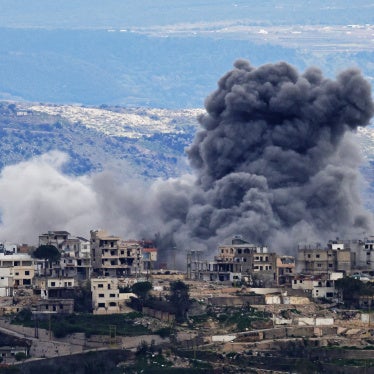Human Rights Watch today expressed strong concern about a provincial court ruling in the highlands of northeastern Cambodia that dispossesses more than 900 indigenous people of their ancestral lands.
On March 23, the provincial court in Ratanakiri province ruled against a civil complaint brought by ethnic Jarai and Tampuen people in three villages.
Lawyers from Legal Aid of Cambodia (LAC), the non-governmental organization that represented the three villages, charged the villagers had been tricked into giving up 1,200 hectares of their land to Royal Cambodian Armed Forces Gen. Nuon Phea.
"The verdict sets a bad precedent for indigenous land rights," said Sidney Jones, executive director of the Asia Division of Human Rights Watch, one of several international organizations that sent observers to the trial. "It reinforces the idea that powerful individuals can use fraud and intimidation to take away people's land."
LAC lawyer Ea Sopheap argued that district officials and intermediaries working for Gen. Nuon Phea pressured the villagers to thumbprint documents that - without their knowledge - provided legal land titles to the villagers. Those titles were then transferred to Nuon Phea.
District officials acting as middle men for the general admitted to receiving U.S. $35,000 from Nuon Phea's representative, money that the villagers testified they never saw. In addition, 70,000 riel (or approximately $18) was allocated as gifts to each village, to be split among village chiefs, deputy chiefs and chiefs of the local militia. The vast majority of the villagers, however, never received anything more than a "gift" of two kilos of salt.
In the verdict, which took less than ten minutes to prepare after the day-long proceedings, Judge Nong Sok ruled that by thumbprinting sales and land title documents and accepting gifts, that the villagers had agreed to sell their land. The verdict was delivered only in Khmer, though indigenous interpreters were available during the proceedings.
The court ruling calls for the villagers - who eke out a subsistence livelihood by swidden farming - to pay taxes of approximately U.S. $615 plus court costs. At the same time, Gen. Nuon Phea is required to pay an additional 14 million riel ($3500) in compensation to the villagers.
A key issue raised by lawyer Ea Sopheap was the fraudulent nature of the sales agreement produced by local district officials, which transferred land titles that had been thumbprinted and issued in villagers' names to Nuon Phea.
Through the testimony of several Tampuen and Jarai children, LAC showed that titles were drawn up in the names of underage minors. A number of villagers testified that they thumbprinted the documents many times, in the names of other people. District officials admitted during the trial that land titles had even been issued in their own names, despite the fact that they have never been residents of any of the three villages. The villagers, meanwhile, had been told they were thumbprinting documents that would bring "development" to their villages.
LAC called for the fraudulent sales agreement to be voided because the un-dated, photo-copied document did not specify the land's price, boundaries or area - or even the name of the buyer. In addition, the agreement had lists of names and thumbprints of villagers attached on separate sheets.
"Fraud of this sort can only encourage other officials to abuse their power and swindle people out of their land," said Jones.
More than fifty villagers attended the trial, as well as representatives from foreign embassies, the Cambodia Office of the High Commissioner for Human Rights, and other local and international NGOs. Fourteen villagers were called as witnesses by LAC, testifying that they wanted their land back and never intended to sell it.
LAC is now assisting the villagers in bringing the case to the Appeals Court in Phnom Penh.






